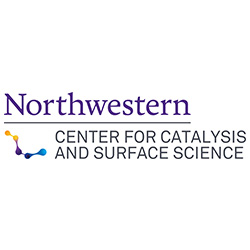Center for Catalysis and Surface Science Student Seminar Series

When:
Friday, March 15, 2024
12:00 PM - 1:00 PM CT
Where: Ryan Hall, 4003, 2190 Campus Drive, Evanston, IL 60208 map it
Audience: Faculty/Staff - Student - Post Docs/Docs - Graduate Students
Contact:
Kimberly Leroi
(847) 467-3396
kimberly.leroi@northwestern.edu
Group: Center for Catalysis and Surface Science (CCSS)
Category: Lectures & Meetings, Environment & Sustainability
Description:
Center for Catalysis and Surface Science (CCSS) Student Seminar Series
Friday, March 15, 2023 | 12-1pm CT
Ryan Hall, 4003 | 2190 Campus Drive
Lunch provided
Join the Center for Catalysis and Surface Science (CCSS) for the Student Seminar Series. Hear from graduate students and postdoctoral scholars during three presentations. This month's speakers are Xinrui Zhang, Siobhan Brown, and Adrien Deberghes.
About the Presentations
Speaker: Xinrui Zhang
Title: Identification and Evolution of Active Sites in Isomorphously Substituted Fe-ZSM-5 Catalysts for Methane Dehydroaromatization (MDA)
Abstract: Natural gas, predominantly composed of methane, represents a globally distributed source of fossil fuel energy. There is significant interest in the conversion of this abundant resource into value-added chemicals, rather than its direct combustion as a fuel source. Among all the attempts, methane dehydroaromatization (MDA) offers a promising transformation pathway, wherein methane is converted into aromatics (principally benzene) and hydrogen through a one-step reaction under non-oxidative conditions. In this study, we prepared isomorphously substituted Fe-ZSM-5 catalysts with exclusively isolated or low-polymerized sites up to 3.2% Fe weight loading by adding EDTA to the crystallization gel. These catalysts exhibit no induction/activation period and a significantly higher product yield compared to the commonly-used Fe/ZSM-5 catalysts prepared by incipient wetness impregnation method. Furthermore, our investigation concentrated on the evolution of iron sites during the post-synthetic treatments. Most importantly, we quantitively demonstrates the quantitative relation between Fe site isolation and catalytic activity.
Speaker: Siobhan Brown
Title: Studies of CO2 hydrogenation over Cu on transition metal carbides and nitrides on alumina supports
Abstract: Transition metal carbides and nitrides (TMC, TMNs) are a fascinating class of materials which exhibit unique properties such as dynamic surfaces, bulk stability, and high catalytic activity. The metals in TMC/TMNs are oxidized by the presence of C, or N yet still maintain metallic characters and have electronic structures which tend to resemble those of the noble metals (Pt, Pd). They are well known, but not particularly well studied, though Mo2C and Mo2N have been extensively studied for a variety of applications, but others much less so.
Reactions of CO2 + H2 are involved in methanol synthesis, RWGS, and methanation reactions. For example, Cu/Zn/Al is the standard industrial methanol catalyst. The typical methanol synthesis process relies on high recycle and operate at moderate temperatures and high pressures (240 °C, 50-100 bar) to prevent Cu sintering and activity loss. Development of new, more active, stable, and high single pass conversion catalysts remains a critical area of interest. Thus, methanol synthesis represents an attractive vehicle to study TMC/TMNs as active supports.
In this talk, we have evaluated a series of Cu based CO2 hydrogenation catalysts on alumina supported TMC, and TMNs with early transition metals (V, Cr, Mo, Fe, Co). The materials are characterized by both pre- and post-reaction (TEM, XRD, XPS, BET), and by in-situ characterization to study the materials under reaction conditions (XRD, PDF). The effect of the composition of the catalyst on conversion and selectivity to C1 products is evaluated by time on stream experimentation. Finally, the potential surface mechanisms are evaluated via TPD and reaction testing.
Speaker: Adrien Deberghes
Title: Indirect Electrooxidation of Cyclohexene by Active Halogen Species in a Liquid Diffusion Electrode Cell
Abstract: We are in urgent need of sustainable production routes for the fundamental chemicals that our society requires to function. Electrocatalysis, or the use of electricity to promote catalyzed chemical reactions, can provide a transformational solution to this problem by replacing temperature and pressure (produced by burning fossil fuels) with electricity as a driving force for chemical reactions while simultaneously reducing the amounts of toxic reagents and byproducts involved. As we transition to a future powered by cheap and abundant renewable electricity, electrocatalysis will thus be an incredible opportunity to enable sustainable chemical production.
One ideal candidate for electrification is the field of selective organic oxidation reactions, which are critical for converting carbon-based feedstocks into a plethora of products that we rely on. For example, epoxides and diols, two common types of oxidation products, are necessary to produce essentials including plastics, soaps, and pharmaceuticals. Traditional oxidation processes, in addition to requiring fossil fuel resources to provide a driving force, often employ huge quantities of dangerous reagents such as nitric acid. Electrochemical processes have the potential to replace these hazardous oxidants with water, while also relying on more benign catalysts than traditional processes.
Here, I explore the indirect electrochemical oxidation of cyclohexene towards cyclohexene oxide via halogenated intermediates in a liquid diffusion electrode (LDE) cell. I show that halogen ion identity, concentration, and electrolyte pH play an important role in determining product distribution and Faradaic efficiency, and demonstrate an optimization towards the production of halohydrins, which can be easily epoxidized via further reaction with basic media. Faradaic efficiencies of over 50% towards the corresponding halohydrin are observed, while the application of an LDE cell allows for facile separation of the organic phase containing the halohydrin product.
The mission of the Center for Catalysis and Surface Science (CCSS) is to promote interdisciplinary research fundamental to the discovery, synthesis, and understanding of catalysts and catalytic reactions essential to modern society. As a part of the Paula M. Trienens Institute for Sustainability and Energy, CCSS applies fundamental advances in catalysis science towards applications in alternative fuels, abatement of harmful emissions, resource recovery concepts, new processing routes, and many other strategies towards making chemicals more sustainable.